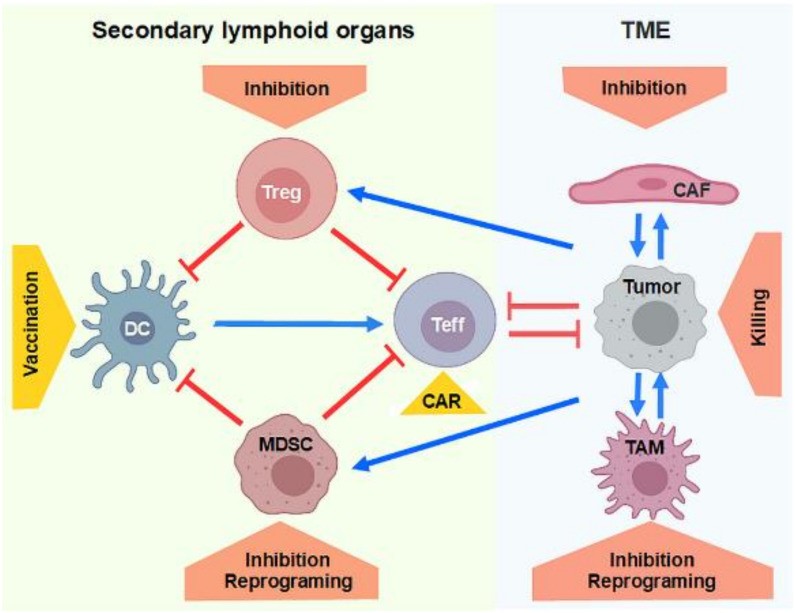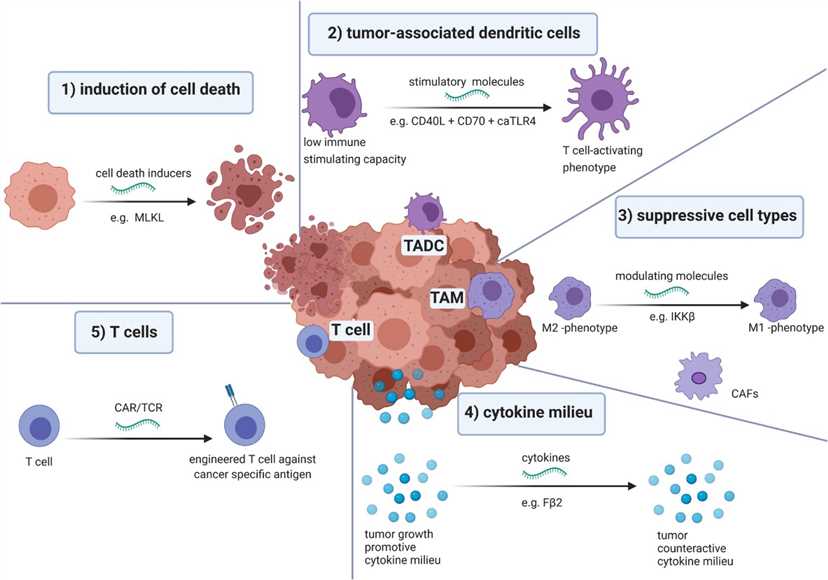Nucleic acid therapeutics have shown unprecedented potential for a wide variety of diseases such as cancers. These therapeutics are a diverse class of DNA or RNA such as plasmids, mRNA, antisense oligonucleotides (ASOs), siRNA, miRNA, small-activating RNA (saRNA), aptamers, gene-editing gRNA, as well as immunomodulatory DNA/RNA. Nucleic acid therapeutics have versatile functionalities and applications in tumor therapy including:
 Fig.1 Nucleic acid-based strategies for tumor therapy.1,3
Fig.1 Nucleic acid-based strategies for tumor therapy.1,3
The current state-of-the-art the use of mRNA as a vector for in situ delivery of mRNA encoding therapeutic proteins includes mAbs or antibody fragments, cytokines, and proteins with immune-activating potential, as well as using mRNA for the therapeutic engineering of tumor-specific T cells in the context of adoptive cell therapy (Fig.2).
Targeting tumor-stroma interactions by RNAi-based approaches is a promising strategy in the search for novel treatment modalities in human cancer. RNAi treatments elicit their pharmacological effect via non-coding RNAs (ncRNAs), which regulate events of the cell instead of translating into proteins, and with siRNAs and miRNAs, RNAi acts rapidly.
 Fig.2 The in vivo application of mRNA to modulate the TME.2,3
Fig.2 The in vivo application of mRNA to modulate the TME.2,3
Nucleic acid drugs are being established as the third modality besides small molecule and antibody drugs. No nucleic acid drugs have been approved for the treatment of cancer, but several nucleic acid therapeutics are currently in clinical trials. Nucleic acid drugs have outstanding properties not found in other modalities, but also have many challenges including low stability rapid clearance from the blood circulation, delivery to target cells, inefficient uptake of the nucleic acid into cells, and immunogenicity. Some strategies have been developed to overcome these challenges such as using exosomes or nanocarriers. Nucleic acid delivery to the TME could transform a pro-tumoral and immuno-suppressive TME into a toxic environment for cancer cells.
Our scientists help you unmask essential cancer-promoting processes in TME and pioneer the development of promising new therapies. A series of critical discoveries in the last decades have shown therapeutic nucleic acids might be the potential therapeutic approach to reshaping TME. Creative Biolabs has developed various robust platforms related to Therapeutic Nucleic Acids and can provide nucleic acid biosynthesis services such as DNA, siRNA, miRNA, gene-editing gRNA, etc. If you have any questions, please feel free to contact us.
References
For any technical issues or product/service related questions, please leave your information below. Our team will contact you soon.
All products and services are For Research Use Only and CANNOT be used in the treatment or diagnosis of disease.
 NEWSLETTER
NEWSLETTER
The latest newsletter to introduce the latest breaking information, our site updates, field and other scientific news, important events, and insights from industry leaders
LEARN MORE NEWSLETTER NEW SOLUTION
NEW SOLUTION
CellRapeutics™ In Vivo Cell Engineering: One-stop in vivo T/B/NK cell and macrophage engineering services covering vectors construction to function verification.
LEARN MORE SOLUTION NOVEL TECHNOLOGY
NOVEL TECHNOLOGY
Silence™ CAR-T Cell: A novel platform to enhance CAR-T cell immunotherapy by combining RNAi technology to suppress genes that may impede CAR functionality.
LEARN MORE NOVEL TECHNOLOGY NEW SOLUTION
NEW SOLUTION
Canine CAR-T Therapy Development: From early target discovery, CAR design and construction, cell culture, and transfection, to in vitro and in vivo function validation.
LEARN MORE SOLUTION